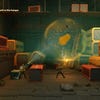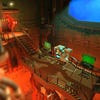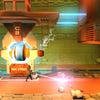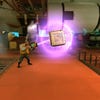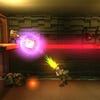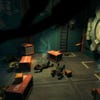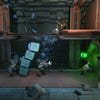Rochard
Crate expectations.
This experimental impulse is best indulged in the early stages as you fend off the attacking pirates using only your basic tools. Lobbing a crate into the face of an enemy, or dropping one with a cartoonish crunch onto their head, never gets tired. You might use the G-Lifter to tug open an overhead hatch, crushing foes under a convenient but rewarding avalanche of junk, or wait for the right moment to pull the plug on a red forcefield, sending them tumbling through the floor and into some terrible predicament below.
For me, the defining moment came when I noticed that shots fired at a crate being G-Lifted get curved around by the whirling gravity. Earning a trophy for warping a pirate's bolts back at him was a perfect illustration of the smile-inducing feedback sequence that goes experimentation-realisation-execution-reward.
And then, far too early, the game makes one of its few mistakes. Sadly, it's a big one. It gives Rochard a gun. In the short term, it's a bonus. Dealing with enemies becomes much easier, especially as Rochard's health is quickly whittled away. In the long term, it sends the design down two mutually exclusive routes. The physics puzzles and platforming head off down one road, while shooting (and later bomb-throwing) takes its own, more visceral path.
All the inventiveness of the early encounters evaporates, as instead of coming up with scenarios where brains win the day, you're faced with blunt quick-draw situations where blasting is the only answer. Even in situations where you could conceivably use the G-Lifter to deal with an enemy in a less obvious way, the risk of death weighed against the simplicity of just shooting them tends to tip your hand in the least interesting direction.
The game never really recovers from this unfortunate decision. It's still a confidently presented romp, and has more than it's share of inspired puzzles, but it never reaches the heights it is so clearly capable of.
Missed opportunities can also be found in the story, which follows a predictable line, while the characters are never as funny as they should be. Indeed, the whole tone of the game is hard to pin down. It feels like it should be funny, but it rarely is. Rochard himself certainly looks and sounds funny - basically the Heavy from Team Fortress 2, given a Pixar twist and John Goodman-style voice - but the dialogue takes everything surprisingly seriously. Not that the game should be wacky, but it's definitely missing a layer of irreverence that would turn many of its weaker plot moments into gags rather than cliches.
Between the strangely absent humour and the ill-advised diversions into generic shoot-em-up territory, Rochard squanders enough of its potential to hold it back from something truly greatness. The tragedy is that this greatness can still be glimpsed, resulting in a game that invites passionate defence but never quite earns it.

